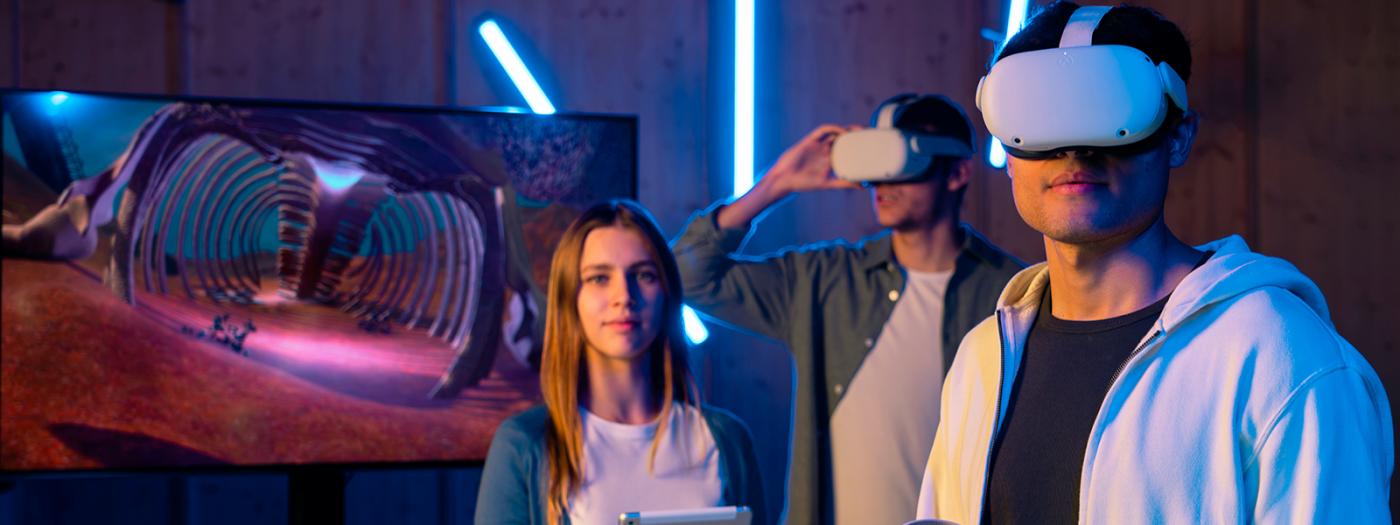The course Interactive installations aims to provide students with the skills and knowledge to design and build innovative interactive technology systems. During this course, specific technical knowledge will be acquired and a series of projects will be physically implemented in the form of installations having a quality finished product at the end of the semester. To do this, the students will be divided into groups of 4/5 people, each acquiring a specific role, in order to develop the projects. The roles of each group will be: Producer, Artist, Hardware Technician, Software Technician and Assistant Technician (only in groups of 5 people).
Titular Professors
The Learning Outcomes of this subject are:
RA.01 Assemble different electronic components with motors, batteries or power supplies
RA.02 Being capable of recognizing different electronic components
RA.03 Being capable of organize and plan using the right tools
RA.04 Test the product with the finality of having a remarkable final quality
RA.05 Having the knowledge to be able to find relevant information that has not been given in class
RA.06 Know how to create physical and virtual 3D elements which have a real utility
RA.07 Programming in a structured and modular manner
RA.08 Being capable of creating new ideas
1) Creation of the idea:
- Definition of interactive installations
- Examples
- Teams and roles
- State of the art
- Thematic
2) Technical tools:
- Raspberry
- Python
- Graphical programming
- Electronic sensors and actuators
- Connectivity between devices and DB
- Digital image processing
3) Project implementation:
- Technological design
- Prototyping
- Project realization work
4) Testing:
- UX testing
This subject is imparted using 4 different methodologies:
1. Theoretical classes: Presentation of the theory by the teacher and the student taking notes (Lecture) or with student participation.
2. Tutoring: Personalised work with a student or group, in the classroom or in a small space. This refers to tutoring as a teaching resource of "compulsory use" by the student to follow a learning programme (excluding "assistance" tutoring for doubts, guidance to the student, etc.). Normally tutoring is a complement to non-classroom work (negotiating/guiding independent work, monitoring and evaluating work, guiding extension, etc.).
3. Project-based learning: Development of the subject based on solving a project or various projects (in groups or individually) where the student discovers the concepts as they are necessary for the development of the project.
Project
In this part of the evaluation, students design and implement a group project in the form of an interactive installation. To do so, they put into practice the concepts provided in the master classes and progressively advance in the definition and construction of the final product.
Oral Presentations
Throughout the semester there are 2 checkpoints that will serve to evaluate the work of each team at important moments, in which each group will have to present the work they have been doing. Each of the presentations will be attended, apart from the professors, by a specialist in the topic being discussed.
Self-evaluation
In the same frequency as the previous evaluation system, one of the tasks to be performed is to evaluate each other. In this way, the teacher will be able to get an idea of how well the team is working together and the perceived workload within the team.
Class participation
This part of the grade consists of evaluating attendance at class work sessions.
Portfolio
It consists of the writing of an individual document in which the student shows the tasks carried out during the course. This document will be handed in at the end of the course and will summarize the project developed during the course.
Final evaluation
The final grade of the course will be given by the following formula:
Final_grade = 75% Project + 10% Presentations + 5% Self-evaluation + 5% Class_participation + 5% Portfolio
Banzi, M. (2016). Introducción a Arduino. Ed. Anaya Multimedia. Madrid.
Monk, S. (2016). Programming the Raspberry Pi: Getting Started with Python, Second Edition. McGraw-Hill Education.
Rodgers, P. A., & Milton, A. (2013). Research Methods for Product Design.
Chen, W. (2020). Interactive Installation: Art & Design. Artpower International Publishing Co. Ltd.
